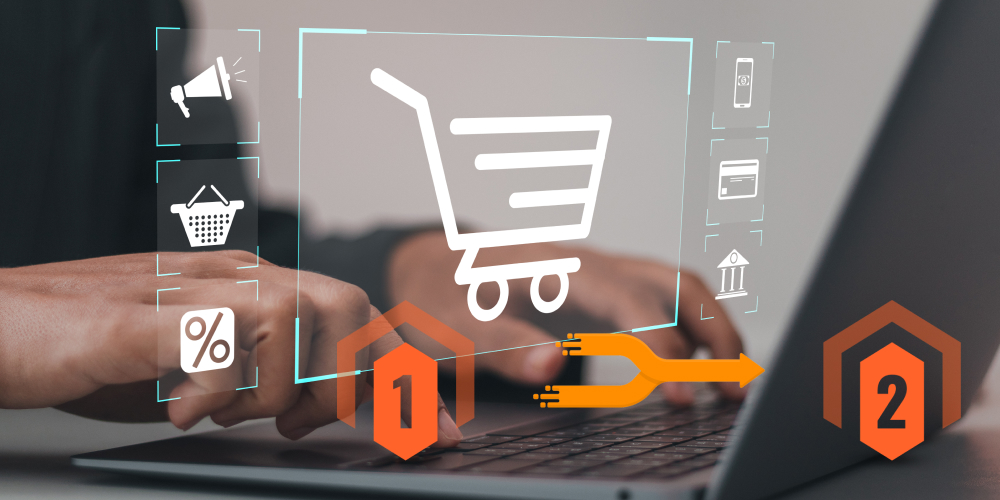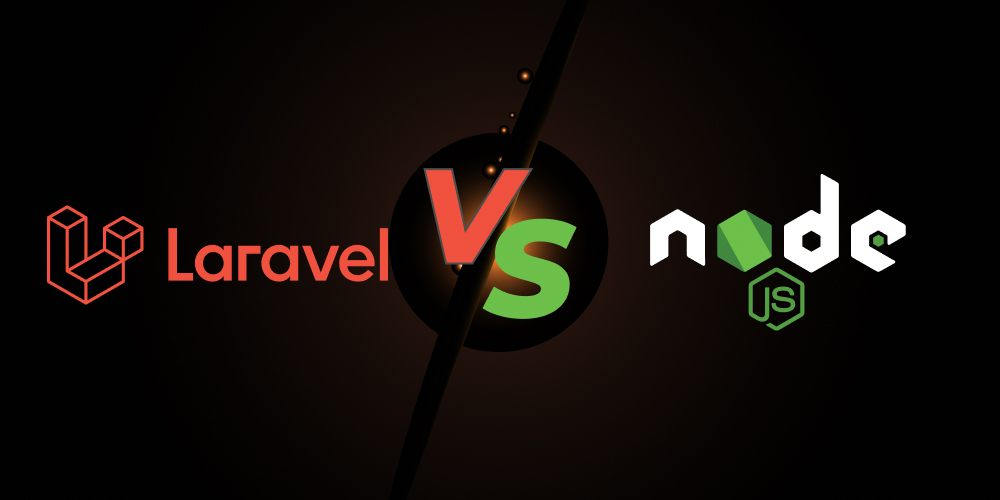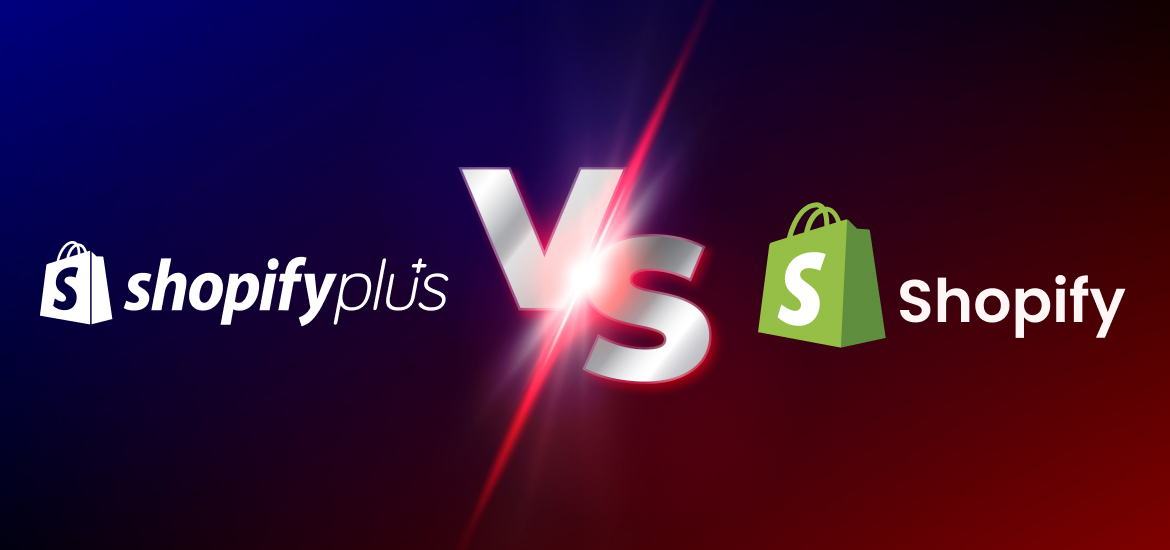With growing businesses, companies are seeking more efficient ways to make their eCommerce platforms better. For achieving better performance, enhanced customer service, and greater flexibility Salesforce commerce cloud (SFCC) to Shopify plus migration has emerged as a significant move among eCommerce brands. Although SFCC is a strong platform, it sometimes becomes restrictive when more customization and low costs are required.
This detailed blog talks about why businesses consider doing Shopify Plus migration. What are the key benefits of shifting from SFCC to Shopify Plus? What challenges can one face and how to tackle them?
Why Businesses are Planning to do Migration
Before getting into a detailed discussion about why businesses are planning to opt for migration let’s see some differences in Shopify Plus vs Salesforce commerce cloud in the given table:
| Shopify Plus | Salesforce Commerce Cloud |
|---|---|
| Small and mid-size stores | Large enterprises |
| Scalable | Scalable but needs customization |
| User-friendly and intuitive interface | Requires steep learning curves |
| Faster time to market | Longer time to market |
| Backs headless commerce | Customizable but needs in-depth development |
| Low maintenance costs | High maintenance costs |
| High-grade security, PCI DSS compliance | Same security level requiring additional manual set-up |
| Smooth third-party app integrations | Fewer out-of-the-box integrations |
1. Cost-Efficient
The platform handling complexities and high Salesforce commerce cloud pricing are making it less attractive for eCommerce brands. On the other hand, the Shopify Plus eCommerce platform due to low Shopify Plus pricing is one of the main reasons behind it becoming a favorite choice among business owners.
2. User-friendly Interface
Another reason behind shifting to Shopify Plus is its user-friendly interface. This platform is intuitive and easy to use even for brands having limited technical resources. On the other hand, SFCC, being powerful needs, a steep learning curve making it difficult to use.
3. Scalability and Customization
Although a certain degree of customization is offered by SFCC, Shopify Plus gives a range of integrations and open architecture allowing businesses to customize their storefront as per their unique business requirements. Moreover, Shopify Plus offers more control over website operations feasible for brands seeking scalability.
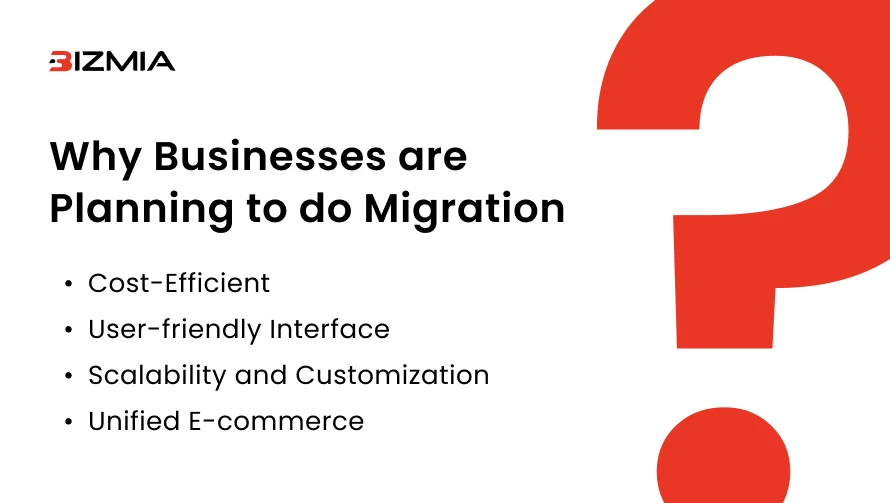
4. Unified E-commerce
The excellent omnichannel tools of Shopify Plus make it easier to connect your retail stores with social media platforms such as Instagram, marketplaces like Amazon, and physical retail locations. In contrast, rigid omnichannel capabilities of SFCC are not that attractive for eCommerce brands.
Key Advantages of Shopify Plus Migration
Some Shopify Plus benefits include its flexibility, advanced features, Shopify Plus headless commerce, faster time-to-market, high security, and low maintenance cost. Let’s get into details:
1. Flexibility
The exceptional scalability of Shopify Plus is one of its primary benefits. When your business grows it needs more advanced functionality and features. Here comes Shopify Plus facilitating site operations such as handling transactions, increased traffic, and product catalogs.
This eCommerce platform handles a high-volume of online traffic without any uninterrupted shopping experience. The scalability offered through Shopify Plus particularly helps in peak sales seasons like Black Friday, Cyber Monday, and January Sales.
Are you aiming for scalability in your online business?
2. Modern Features
Advanced features of Shopify Plus give your business a competitive edge and better functionality. Shopify Plus automates repetitive tasks such as order fulfillment, inventory management, and customer communication. Also, a tailored checkout experience like personalized discounts or specific payment methods can be designed with Shopify.
Moreover, real-time insights into inventory performance, customer behavior, and sales trends are provided by Shopify Plus with dynamic reporting features and detailed analytics. Such analytics assist in data-driven decisions and optimizing business strategy.
3. Shopify Plus Headless Commerce
One of the standout features of Shopify Plus is Headless commerce. It separates the back end and front end giving complete flexibility to businesses in user experience and design. With headless commerce complete control over the presentation layer can be obtained. It offers faster loading time and better performance. Moreover, eCommerce brands can connect with various customer touch points such as voice commerce, kiosks, and mobile apps through Shopify Plus headless commerce.
4. Faster Time-to-Launch
Online retail businesses can scale and launch their online outlets faster on Shopify Plus as compared to traditional platforms like SFCC. A complete ecosystem Shopify Plus possesses pre-built tools like plugins, apps, and integrations to avoid complex custom development. Moreover, it facilitates the process of store maintenance and setup. Rapid testing of products, ideas, and strategies is also enabled by Shopify Plus so you can launch your website and products faster in the market. For a smooth process, businesses can also acquire expert Shopify Plus migration services.
5. Enterprise-Grade Security
The security and safety of your clients and business are important in today’s tech world due to the threat of prevailing cyberattacks. This Shopify Plus platform gives enterprise-grade security features to help in handling critical client information. Being PCI DSS compliant, it ensures payment card security meets the latest data security standards.
Also, automatic store backups, 24/7 customer support, and security monitoring are offered by Shopify Plus for detecting and safeguarding your online brands from cyber threats.
6. Low Maintenance Costs
Complex eCommerce platforms like SFCC need high maintenance costs. On the other hand, some platforms offer low costs such as low Shopify pricing. With the Shopify Plus platform, you do not need to have an in-house team for maintaining technicalities because it takes care of the complete infrastructure. Also, online brands can reduce development charges avoiding complexities with Shopify Plus.
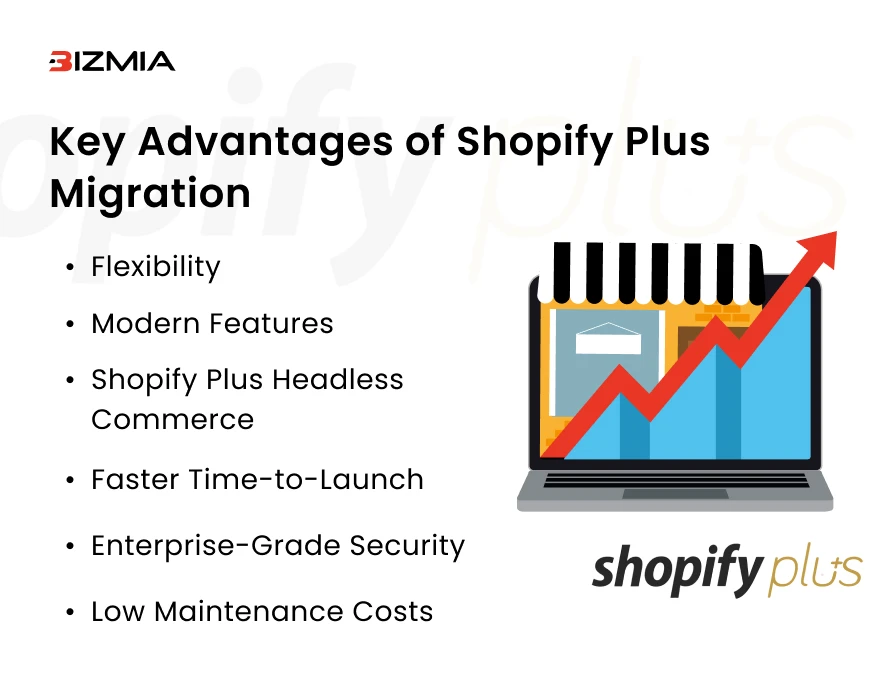
Common Shopify Plus Migration Challenges and How to Tackle Them
The Salesforce commerce cloud to Shopify Plus migration also comes with a set of challenges. If you understand the nature of challenges, you can easily tackle them. We have given some examples of challenges you might come across during migration:
1. Data Migration Complexities
It can be complex to shift data like order history, product catalogs, and client data from SFCC to Shopify Plus. To avoid data loss, you can consult with Shopify migration experts ensuring smooth migration.
How to Tackle
A smooth data transfer can be ensured by partnering with an expert migration team. Such a team would help in data mapping, validation, and testing avoiding disruptions in operations.
2. Customization Challenges
Many customization options are offered by Shopify Plus, but a number of challenges are faced in the case of SFCC while reconfiguring the features. It would take time to re-establish third-party integrations of Shopify Plus.
How to Tackle
Finding a solution with Shopify Plus becomes easier due to available apps and integrations. However, an expert Shopify professional can assist with custom development if required.
3. Staff Training
Once a brand shifted to Shopify Plus the staff required some professional training to get familiar with the new interface as the team was trained previously to work with SFCC.
How to Tackle
You can arrange early training for staff to avoid complications during and after migration. Such professional training enables staff to acquire skills to work efficiently.
Some Success Stories of Brands Switched to Shopify Plus
Many popular eCommerce brands have already shifted from SFCC to the Shopify Plus platform. We are talking about a few success stories here:
1. Heinz
A food industry giant in the USA, Heinz, has successfully moved to Shopify Plus to improve its omnichannel approach and eCommerce platform’s performance. Moreover, with this transition, Heinz has improved overall efficiency minimizing complexity.
2. Allbirds
Another brand that has moved to Shopify Plus from SFCC is the shoe and apparel company Allbirds. After migration, it has observed improvements in global reach, scalability, and user experience.
Is Shopify Plus the Right Choice for Your Business
If you are an enterprise, or looking for business expansion, or improving eCommerce capabilities, Shopify Plus would be the ideal choice. Moreover, it could be the perfect fit if you are seeking an easy-to-use and scalable platform.
Wrapping Up
You can future-proof your eCommerce business by migrating to Salesforce commerce cloud to Shopify Plus. Shopify Plus offers everything businesses need for growth including high scalability, low maintenance costs, and advanced features. Although this migration process involves some challenges, it can be overcome with expert assistance ensuring a smooth transition and setting up business for success.
FAQs
Why are businesses shifting from SFCC to Shopify Plus?
Many businesses are moving from SFCC to Shopify Plus due to its dynamic features, scalability, and cost-effectiveness. It also makes business growth easier by offering personalized solutions and resulting in enhanced customer engagement. Its intuitive and easy-to-use interface also makes it user-friendly.
What is the key difference in Shopify Plus vs Salesforce commerce cloud?
The key difference between Shopify and Salesforce commerce cloud includes scalability, ease of use, pricing, ability to handle omnichannel commerce effectively, and customization options. While the Salesforce commerce cloud is expensive and complex, Shopify Plus is popular for its user-friendly interface.
How long would it take to migrate from SFCC to Shopify Plus?
Usually, this migration process can take 3 to 6 months. However, the exact timeline depends on the amount of data to be migrated, integration complexity, and the size of your brand outlet.
What are the costs involved in Shopify Plus migration?
Costs of migrations depend upon the nature of the project’s complexity. The primary costs usually involve Shopify Plus subscription charges, migration services costs, design and development expenses, and charges for additional customization and integrations.




